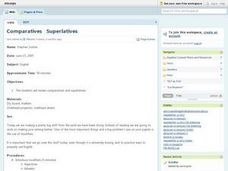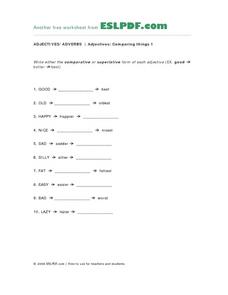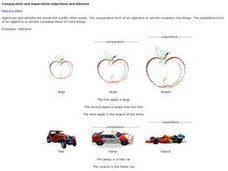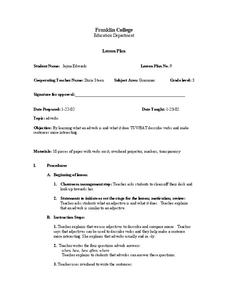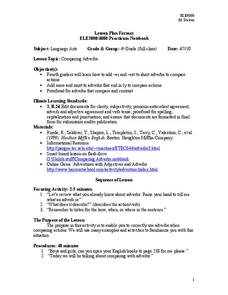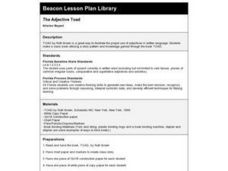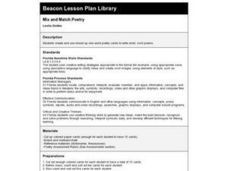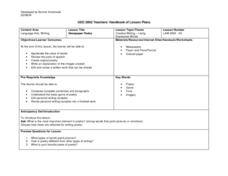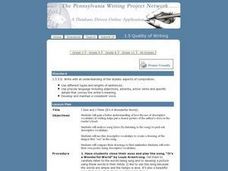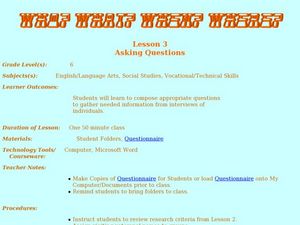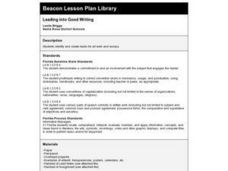Curated OER
Comparatives Superlatives
Review comparatives and superlatives. Middle schoolers are introduced to modifiers such as Adjectives and Adverbs. They will talk about comparatives and superlatives such as: What makes them different, fo over rules for each type of...
Curated OER
Describe and Compare: Teacher Edition
Note: This is the teacher's guide to Pimsleur's French lesson called "Describe & Compare." The guide discusses the lesson's purpose, objectives, and designed learning outcomes. It presents information on each of the activities the...
Curated OER
The City Life or the country Life: conventions: Comparative and Superlative Forms of Adjectives and Adverbs
Reinforce knowledge of adjectives and adverbs by game playing. To better understand English conventions young writers, use flashcards to identify the base word and its comparative or superlative form.
Curated OER
Adjectives/Adverbs; Adjectives: Comparing things 1
In this language arts worksheet, students write the comparative or superlative form of the given adjectives. The worksheet is intended for English as a second language learners.
Curated OER
Comparative and Superlative Adjectives and Adverbs
In this comparative and superlative worksheet, students review rules and examples of comparative and superlative forms of adjectives and adverbs. Students then complete fill-in-the-bank, multiple choice, and other practice problems.
Curated OER
Vivid Adjectives
Students review adjectives and play a game where students compete to see who can write the most adjectives for a given noun. They write a story about one topic and try to use a variety of adjectives in sequence tto describe a noun.
Curated OER
Adverbs
Third graders identify the function of adverbs and use them in sentences. They discuss how adverbs answer when, how, how often, and where, and identify the nouns, articles, adjectives, verbs, and adverbs in sentences. Students then act...
Curated OER
Mouthwatering Adjectives!
Third graders write descriptions of food items in order to create a restaurant menu. They use adjectives to describe mouth-watering and vivid food and compare it to a boring adjective-lacking menu. They design and share their menus with...
Curated OER
What's for Dinner? (Using Adjectives)
Sixth graders use adjectives to describe foods listed in restaurant menus. In cooperative groups, 6th graders create menus and identify the adjectives used in the menu created by their group.
Curated OER
Adverbs
Fourth graders add er and est to adverbs, add more and most to adverbs, and proofread adverb sentences that compare. For this adverbs lesson plan, 4th graders complete worksheets and play an adverb game.
Curated OER
The Adjective Toad
Students listen to the story Toad, then the story is reread without any adjectives. The class discusses the importance of details in a story. Then the class creates a collaborative book following the same story pattern.
Curated OER
Aggravating Adverbs Too
Fourth graders explore how to use the correct forms of adverbs to compare actions.
Curated OER
Mix and Match Poetry
Third graders compare boring and vivid words: adjectives, adverbs, and verbs. They list them and come up with 10 vivid words on cards. They shuffle all the cards and use 10 to write "vivid" poetry.
Curated OER
Seeing Eye "Buddies"
Third graders observe a variety of sights within their schoolyard habitat and sitting quietly back-to-back with a partner describe what they see. The partner sketches the observations, 3rd graders compare drawings with the object described.
Curated OER
Spanish Sentence Structure
Instruct your class on how to put together a sentence in Spanish. The resource covers the different parts of speech, showing how the Spanish version of each sentence compares with the English version. While there are no procedures...
Curated OER
Making Choices
Students explore the life of Harriet Tubman. They examine a painting of Harriet Tubman and consider the tools used to communicate information about her. Sudents describe how the color of a painting explains the mood of the illustrator....
Curated OER
Newspaper Poetry
Students cut out nouns, verbs, adjectives, and adverbs from newspapers and create poems using words they have found.
Curated OER
I See and I Think (It's A Wonderful World)
Students analyze song lyrics (by listening to the song) to pick-out descriptive vocabulary. They use this descriptive vocabulary to create a drawing of the images they "see" in the song. They compare their drawings to find similarities...
Curated OER
Reading and the Appreciation of Style
Students are introduced to hurricanes by answering questions. They practice using new vocabulary words. They work together in pairs to compare the words used in different levels of the text.
Curated OER
Who? What? When? Where? Asking Questions
Sixth graders interview Veterans or role play to answer who, what, where, when questions. In this Veteran's Day questioning activity, 6th graders learn about the events in the military service of veterans. Students may simulate...
Curated OER
Lesson: A Garden Party of My Own
Kids look at a beautiful work of art to practice grammar, make connections from life to art, and sketching. They identify all the parts of grammar they see in the image, discuss what they see and do on a picnic, and then draw an imaged...
Curated OER
Leading into Good Writing
Discuss the importance of a lead in writing with your upper graders. They examine several examples of leads from literature and practice writing leads for pieces of artwork. They then select a topic from a list and write an introductory...
Curated OER
ACROSTIC POETRY
Students use newspapers or magazines to create an acrostic poem where words are divided into parts of speech.
Curated OER
Lesson 3: Subject and Verb Agreement: Singular Nouns and Pronouns He, She, It
In this subject and verb agreement worksheet, students learn the rules for making the subject and verb agree when there is a singular noun: he, she, it. Students answer 25 questions.


